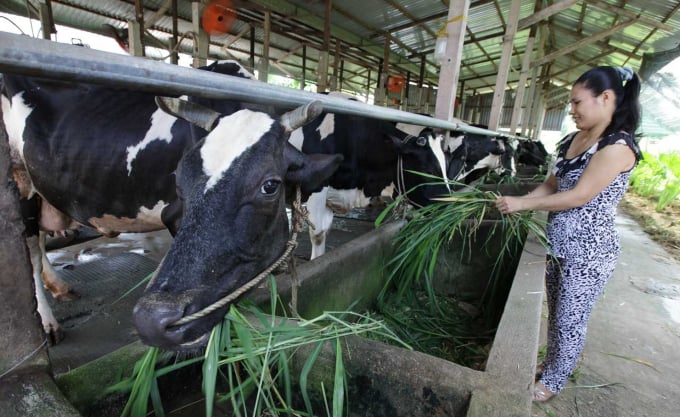November 25, 2025 | 16:48 GMT +7
November 25, 2025 | 16:48 GMT +7
Hotline: 0913.378.918
November 25, 2025 | 16:48 GMT +7
Hotline: 0913.378.918

Link Vinamilk to raise high-tech dairy cows in Cu Chi district, Ho Chi Minh City. Photo: VNM.
To contribute to the high effectiveness and sustainability of agriculture industry restructuring in the coming time as well as follow the Program of Ho Chi Minh City’s digital transformation, the center has implemented series of digital transformation activities.
In particular, the Ho Chi Minh City agriculture extension center conducted a training session on awareness of digital transformation in the agricultural sector for the heads, deputy heads of stations, and related departments. The content of the training sessions focused on the current situation and proposed some orientations to promote digital transformation in the agricultural sector.
The training sessions also introduced series of solutions for digital transformation and effective appliances in almost all sectors in the agriculture industry including cultivation with IoT technology, Big Data was launched via digital technology products. The software allows analyzing data relating to the environment, tree varieties, and its growth phase, which can be watched by consumers according to actual time.
In livestock farming, IoT technology, blockchain, biological technology are adopted widely at large-scale farms. The seafood sector also witnessed strong movement in digital transformation including the use of ultrasonic fish detectors, flow meters, satellite phones, seine net receivers (standing), Dropping/Withdrawing net systems, capture technology, etc. GIS technology and global positioning system (GPS), which all help manage the offshore fishing fleet.
The aquaculture industry applies selective biotechnology to breed high-yield, high-quality, disease-resistant, environmental-tolerant varieties, recirculating aquaculture technology (RAS), Biofloc technology, nanotechnology, sea cage farming technology, cold water fish farming technology.
Artificial technology is applied in shrimp farming to analyze data on water quality as well as management of feeding and health of shrimps. Automatic technology is adopted widely in processing from sorting, packaging, production lines, among others, helping to reduce production costs and ensure the quality of seafood products.
Ho Chi Minh City Agricultural Extension Center serving as a unit with the task of guiding, supporting, and advising farmers to develop the economy in the fields of cultivation, husbandry, and aquaculture of the city's agricultural industry, can not conduct direct sessions to farmers due to the complexity of Covid-19 pandemic.
Therefore, through the training session, the Director of Ho Chi Minh City Agricultural Extension Center Pham Lam Chinh Van asked the technical staff who are leaders of the departments and stations to build different private training exercise for each field of cultivation, husbandry, and aquaculture to introduce to farmers virtually via video clips, helping them gain more knowledge promptly, which suits to the current external environment.
The center held a Workshop on “Training of applying digital transformation in fisheries industry” for technical staff specialized in fisheries of the Center, which introduced Farmext application, a solution for high-tech aquaculture farm management. The project comes from the desire to improve the quality of Vietnam's seafood exports, and at the same time, support farms with indicators, process logs, and international export certifications.
Via aforementioned activities, the center has been stepping by step implementing the topics on digital transformation in agriculture, contributing to the development of the Digital Transformation Strategy of the city in general and the city's agricultural sector as well as Ho Chi Minh City in particular in the current 4.0 technology era.

(VAN) The Ministry of Agriculture and Environment must spearhead the construction of green governance, spanning decision-making processes and investment standards to policy evaluation mechanisms.

(VAN) The Agriculture and Environment sector of Khanh Hoa has achieved numerous milestones over the past 80 years, contributing significantly to the goal of establishing the province as a centrally governed city by 2030.

(VAN) Viet Nam is entering the pivotal period of 2025-2030, moving toward the formulation of the Remote Sensing Law, which will establish a legal foundation for the development of national digital data.

(VAN) The agricultural sector is finalizing the strategic framework for emission reduction, setting the goal of sharply cutting methane and 403.7 million tons of CO2 equivalent and moving toward Net Zero by 2050.
/2025/11/22/2236-1-153832_483.jpg)
(VAN) The National Marine Spatial Planning is opening up opportunities for sustainable blue sea development across 21 coastal localities.

(VAN) Viet Nam’s forestry sector is undergoing a comprehensive transformation, strengthening management, protection, and development efforts to maintain ecological security and drive green, sustainable growth.

(VAN) Viet Nam is accelerating efforts to digitize reservoir operations, from real-time data to hydraulic modelling.